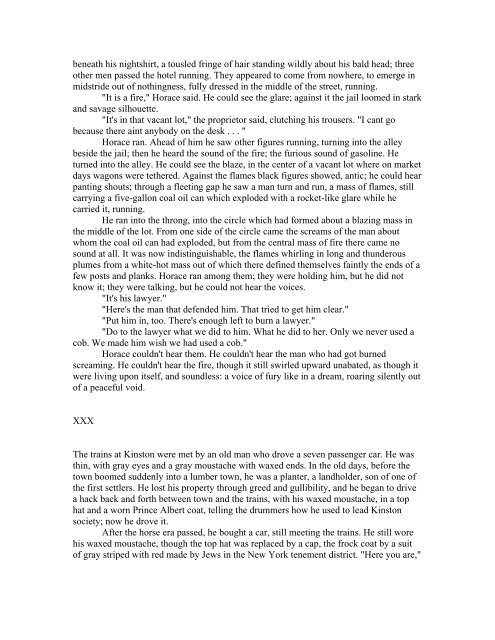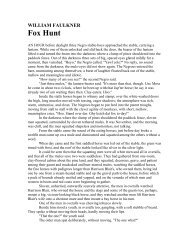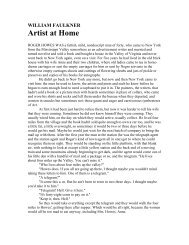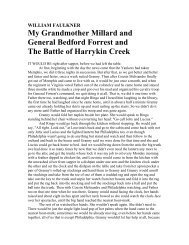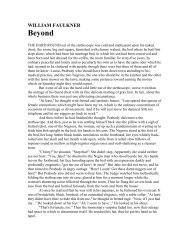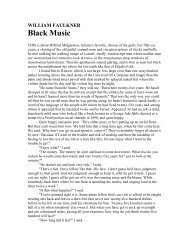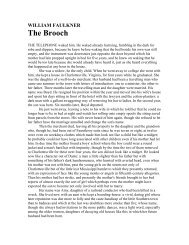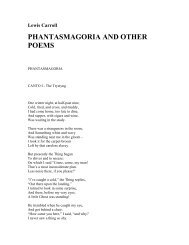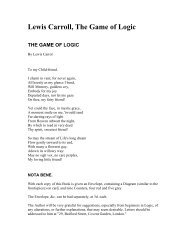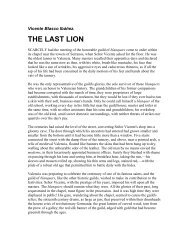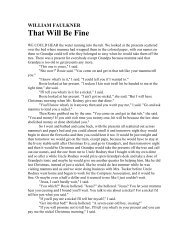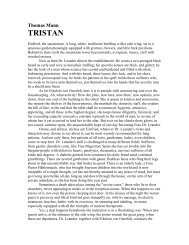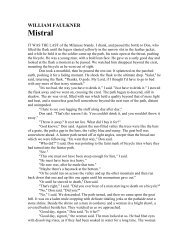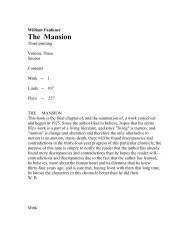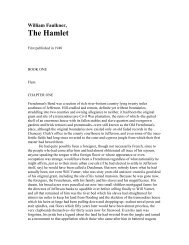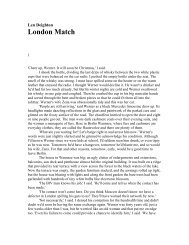William Faulkner, SANCTUARY â WordPress.com - literature save 2
William Faulkner, SANCTUARY â WordPress.com - literature save 2
William Faulkner, SANCTUARY â WordPress.com - literature save 2
Create successful ePaper yourself
Turn your PDF publications into a flip-book with our unique Google optimized e-Paper software.
eneath his nightshirt, a tousled fringe of hair standing wildly about his bald head; three<br />
other men passed the hotel running. They appeared to <strong>com</strong>e from nowhere, to emerge in<br />
midstride out of nothingness, fully dressed in the middle of the street, running.<br />
"It is a fire," Horace said. He could see the glare; against it the jail loomed in stark<br />
and savage silhouette.<br />
"It's in that vacant lot," the proprietor said, clutching his trousers. "I cant go<br />
because there aint anybody on the desk . . . "<br />
Horace ran. Ahead of him he saw other figures running, turning into the alley<br />
beside the jail; then he heard the sound of the fire; the furious sound of gasoline. He<br />
turned into the alley. He could see the blaze, in the center of a vacant lot where on market<br />
days wagons were tethered. Against the flames black figures showed, antic; he could hear<br />
panting shouts; through a fleeting gap he saw a man turn and run, a mass of flames, still<br />
carrying a five-gallon coal oil can which exploded with a rocket-like glare while he<br />
carried it, running.<br />
He ran into the throng, into the circle which had formed about a blazing mass in<br />
the middle of the lot. From one side of the circle came the screams of the man about<br />
whom the coal oil can had exploded, but from the central mass of fire there came no<br />
sound at all. It was now indistinguishable, the flames whirling in long and thunderous<br />
plumes from a white-hot mass out of which there defined themselves faintly the ends of a<br />
few posts and planks. Horace ran among them; they were holding him, but he did not<br />
know it; they were talking, but he could not hear the voices.<br />
"It's his lawyer."<br />
"Here's the man that defended him. That tried to get him clear."<br />
"Put him in, too. There's enough left to burn a lawyer."<br />
"Do to the lawyer what we did to him. What he did to her. Only we never used a<br />
cob. We made him wish we had used a cob."<br />
Horace couldn't hear them. He couldn't hear the man who had got burned<br />
screaming. He couldn't hear the fire, though it still swirled upward unabated, as though it<br />
were living upon itself, and soundless: a voice of fury like in a dream, roaring silently out<br />
of a peaceful void.<br />
XXX<br />
The trains at Kinston were met by an old man who drove a seven passenger car. He was<br />
thin, with gray eyes and a gray moustache with waxed ends. In the old days, before the<br />
town boomed suddenly into a lumber town, he was a planter, a landholder, son of one of<br />
the first settlers. He lost his property through greed and gullibility, and he began to drive<br />
a hack back and forth between town and the trains, with his waxed moustache, in a top<br />
hat and a worn Prince Albert coat, telling the drummers how he used to lead Kinston<br />
society; now he drove it.<br />
After the horse era passed, he bought a car, still meeting the trains. He still wore<br />
his waxed moustache, though the top hat was replaced by a cap, the frock coat by a suit<br />
of gray striped with red made by Jews in the New York tenement district. "Here you are,"


